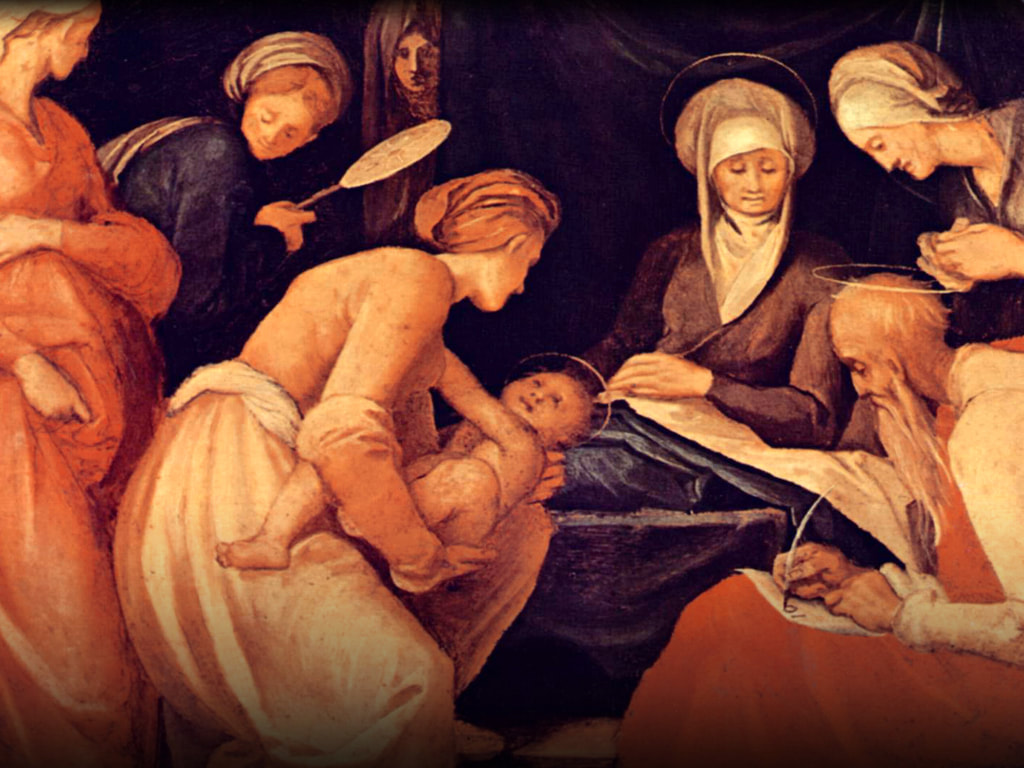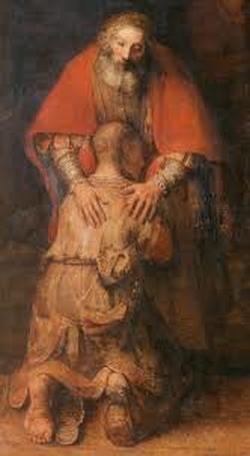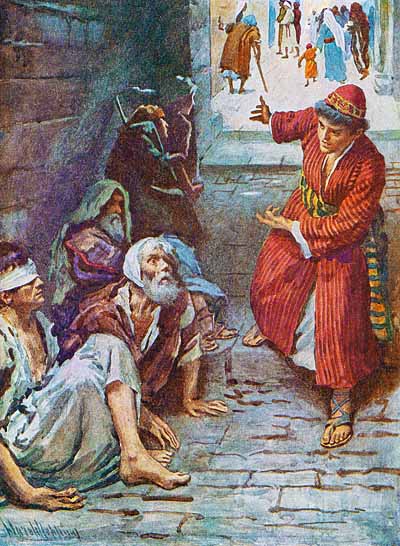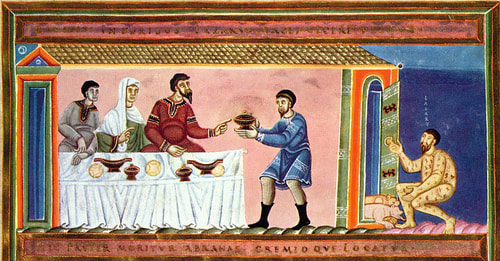June 24, 2018
"And you, child, will be called the prophet of the Most High;
For you will go before the Lord to prepare his ways,
To give knowledge of salvation to his people
In the forgiveness of their sins,
Because of the tender mercy of our God,
Whereby the sunrise shall visit us from on high
To give light to those who sit in darkness and in the shadow of death,
To guide our feet into the way of peace."
Today we observe the birthday of the greatest man ever born outside of Jesus Christ himself, John the Baptist. John was so great, because he was appointed by God to prepare the way of the Lord incarnate, Jesus Christ. Prophets prophesied of this greatest of prophets. Many prophets pointed to Christ, the Lamb of God, through their many words, but only John pointed with his actual finger to him, who would take away the sin of the world.
John is the greatest. Yet, if you were to look at him, you might not think so. He was dressed in camel's hair and ate locusts. He lived out in the wilderness like some vagabond. And if you were to listen to him, you'd perhaps think even less of him. John preached fire and brimstone law. He called people "brood of vipers" and warned them that even now the axe of judgment was laid to the root of the trees and every tree that doesn't bear good fruit will be cut down and thrown into the fire. It didn't matter who you were, whether you were a tax-collector or soldier, Pharisee or scribe, even King Herod, John preached boldly the Law of God.
And so, it is not much of a surprise that while many did flock to hear John and repented in the Jordan River, many hated him and thought he was least among the children of man. And you can imagine how his preaching would go over today. Here in America, we are so used to picking our own preachers. If we don't like what one guy is saying we can hop to another. We have a greater selection of preachers than fast-food restaurants. Everyone has the luxury of finding the preacher, who will preach exactly what his itching ears desire.
Yet, it is important for us to remember that John is the greatest, not because he fulfilled the desires of the sinful masses, but because he performed the task appointed for him by God. God determines who is the greatest. And what God determines to be great is often judged worthless by those, who think they are great.
Sadly, most today still follow after reeds shaking in the wind. And many "Christian" churches embarrassingly follow the course of human opinion in attempts to be greater than John. Yet, when you follow such false teachers, who give up the truth of God's Word, then you walk in the wrong direction. Churches that give up teaching what God teaches from Scripture will point their finger in every which way. But they all point eventually to hell. Only John's finger points to Christ.
John prepares the way of Jesus. How does he do this? John's father Zechariah tells us, "To give knowledge of salvation to his people in the forgiveness of their sins." Where is the knowledge of salvation? In the forgiveness of sins! Yes, John preaches harshly. He doesn't care much for your self-esteem or your attempts to make yourself righteous before God. John wants you to know the way of salvation. And the only way of salvation is through the forgiveness of sins. This is why when the Pharisees and scribes are busy preaching laws and ordinances to follow in order to be righteous before God, John points to Christ Jesus and says, "Behold, the Lamb of God, who takes away the sin of the world!"
There are only two religions in the world. The religion, which John preaches, which depends on the Lamb of God bearing the sins of all people; and the religion of works, in which people strive to earn their own salvation. Muslims seek to obey Allah to gain salvation. The Judaizers seek to obey their interpretation of the Torah. Those trapped under the Papacy and many protestant churches try to please God in order to gain salvation. Even those, whom we categorize as liberal are slaves of the false religion of works. Those who get offended when preachers preach against fornication, homosexuality, divorce, abortion, or unionistic worship are offended, because they don't want to acknowledge their own sin. They want to believe that they are good enough. But no one is good enough. There is no salvation apart from the forgiveness of sins. Everyone needs the Lamb of God to take away their sins.
John preaches the Law without filter to everyone without discrimination, because he doesn't want anyone to think that he doesn't need Jesus to forgive his sins. Beware of preachers, who do not preach the Law. And beware of preachers, who do not preach Christ, the Lamb of God, who takes away the sin of the world as the only way to salvation.
The forgiveness of sins isn't something you work for. It's a gift. Why does God give salvation through the forgiveness of sins alone? Again, John's father tells us in his sermon, "Because of the tender mercy of our God, whereby the sunrise shall visit us from on high to give light to those who sit in darkness and in the shadow of death, to guide our feet into the way of peace." Because of the tender mercy of our God. This is purely undeserved fatherly love. We dwell in darkness and in the shadow of death. And, because God loves us with a father's love, which wrenches his gut, he shines the morning sun upon us. This morning sun is Jesus Christ himself. God sends him to us by pure grace. We didn't even know we were sitting in the shadow of death until John told us to repent. Yet, even before that, God planned to send Christ to make us children of light through the revelation of his death and resurrection for our sins.
John preaches the full council of God as his father prophesied that he would. He not only teaches us that we are in bondage to sin and death and need to repent, and that Jesus has come to save us from our sins. He also teaches us how to walk as children of light on the path of peace. And Zechariah makes clear that you do not walk this path by following a set of laws, but by first having your sins forgiven. It is the morning sun, Jesus Christ, who shines on you and guides your feet on this peaceful path. You can only live as a Christian if you are constantly living under the umbrella of the forgiveness of sins. If you lose sight of the forgiveness Christ won for you with his blood, you lose sight of your salvation and the Christian path, and no work you do will be pleasing in God's sight.
John is the greatest born of woman, because God made him so. He appointed him before the foundation of the world to prepare the way of Christ through his preaching. John was the greatest, because he did not seek to be the greatest, but he pointed to the one, who was far greater than he; one whose sandal straps he was unworthy to stoop down and untie. Although John's preaching ministry spanned a shorter period of time than even my young ministry, he is the greatest, because he demonstrates for all generations what true Christian preaching is all about. Christian preaching is about Christ Jesus. John's purpose is to point people to Christ.
Shortly before John's death, Jesus said of him, "Truly, I say to you, among those born of women there has arisen no one greater than John the Baptist. Yet the one who is least in the kingdom of heaven is greater than he." (Matthew 11:11) This again attests to John's true greatness. He knows that the only way to be great is to be a citizen of the kingdom of heaven. And the only way to be a citizen of God's kingdom is through faith in Christ. So, John, the great one, points sinners to one greater than he, so that those sinners might be greater than the greatest man born of woman. John points sinners to the one, who baptizes with the Holy Spirit, who gives new birth, not of the flesh, not of a woman, but of the Spirit.
Today we observe the greatest birth from a woman outside of the birth of Jesus Christ from the Virgin Mary. Yet, this man points all of us to a much greater birth, which gives us the forgiveness of sins and salvation. This man points us to Jesus, who truly is the greatest. In Baptism, we receive a new birth of the Spirit, which joins us to Jesus Christ, as St. Paul says, “For in Christ Jesus you are all sons of God, through faith. For as many of you as were baptized into Christ have put on Christ.”(Galatians 3:26-28)
God appointed John, so that he would point people to Jesus. The way we honor John is by looking away from him and toward Jesus, who gives us salvation. There is nothing greater than that which John points to. And you can be no greater than if you trust in the Jesus, whom John preaches. Amen.




 RSS Feed
RSS Feed